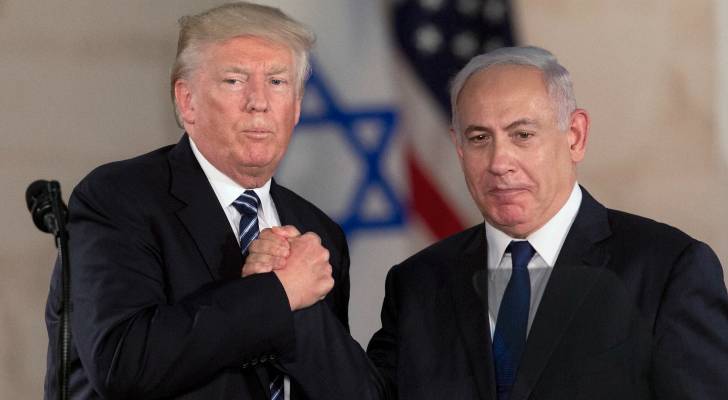US President Donald Trump and “Israeli” Prime Minister Benjamin Netanyahu in Jerusalem. (May 23, 2017) (Photo: AP)
Economic implications for “Israel” after Trump’s return
Hebrew news outlet Ynet published an analysis of the economic implications for “Israel” following Donald Trump’s return to the White House as US President.
The report raises significant questions about the broader economic impact beyond security, emphasizing that changes in American administrations have historically influenced US aid to “Israel”, bilateral trade relations, and the activities of “Israel” and American companies in each other’s markets.
Read more: Trump signs order to end citizenship for babies born to immigrants
Oded Rose, senior policy advisor for the “Israel”-US Chamber of Commerce, shared insights with Ynet on what “Israel” might expect as Trump resumes office.
Rose pointed out that Trump has pledged significant economic changes early in his term, some of which could reverse policies implemented by his predecessor, Joe Biden.
Trade and tariffs
Trump’s economic philosophy, particularly his reliance on tariffs to protect American industries, could have substantial implications for “Israel”. The report noted that if Trump continues this approach, “Israeli” exports to the US, including critical sectors like technology and pharmaceuticals, may face challenges.
Additionally, the report highlighted that increased tariffs on imports from China and Europe could shift global supply chains, potentially disrupting “Israeli” industries dependent on these networks. However, these changes might also present opportunities for “Israeli” companies, provided they adapt to the evolving landscape.
Security assistance
The report emphasized that Trump has been a strong proponent of security cooperation with “Israel.” During his previous term, he increased US security assistance, particularly in defense technologies. If this trend continues, it could provide a significant boost to “Israel’s” defense industries and the broader economy.
However, Oded Rose warned that a focus on defense-related agreements might divert attention from civilian areas like health, renewable energy, and climate initiatives, which received less emphasis under Trump’s administration.
The Middle East and economic opportunities
According to the report, Trump is likely to prioritize expanding peace agreements in the Middle East, potentially building on the Abraham Accords to establish new ties with countries such as Saudi Arabia. These agreements could open up lucrative opportunities for “Israeli” exports in Gulf markets.
However, actions such as increased pressure on Iran could heighten regional tensions, raising security costs for “Israel” and destabilizing the region—both of which could negatively impact the “Israeli” economy.
Strategic preparation
Summarizing the challenges and opportunities, Rose remarked: "Trump’s policies could offer opportunities for deepening security and economic cooperation with the US and other partners, but they also carry significant risks, including disruptions in global trade and potential geopolitical escalation."




